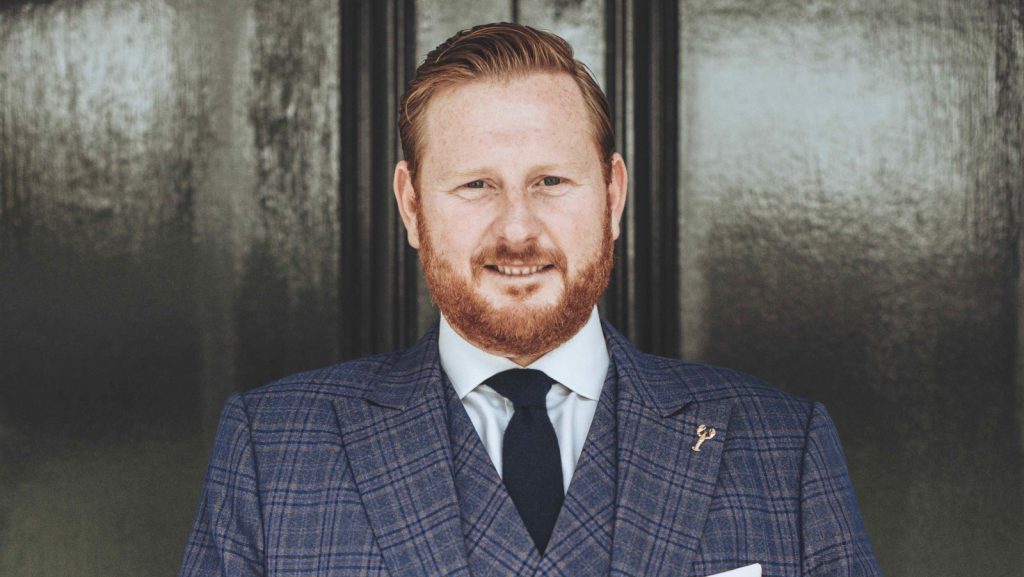Calling all marketers, do you think you send the best emails? Make it official by claiming victory at Everlytic’s You Mailed It Email Marketing…
SA founders who sold $24m a year Lobster Ink platform to US firm netted ‘millions’

Four South Africans who earlier this year sold their online training platform to New York Stock Exchange listed Ecolab, are expected to net millions of dollars from the sale, one of the founders Fasie Malherbe has revealed.
Fasie Malherbe (pictured above), who founded Geneva-based company Lobster Ink in 2006 with fellow South Africans Dale den Dulk, Paul Rowett and Tim Nel, confirmed in an email to Ventureburn on Tuesday (23 July) that the deal had been concluded in the first quarter of the year.
The company – which the four founded with an initial investment of just R22 000 — provides end-to-end online customer training solutions to hospitality and food service companies.
The firm claims it has trained two million people across 130 countries.
In a statement in February — in which it announced the acquisition — Ecolab said Lobster Ink had last year generated sales worth $24-million.
On Tuesday however, Malherbe remained mum on how much the deal was worth, saying only that the company was acquired by Ecolab for “an impressive multiple” of Lobster Ink’s annual $24-million turnover.
“We prefer not to disclose the actual figure,” he added.
Malherbe said the company’s founders started Lobster Ink out of a desire to travel more and and experience the best in hospitality, while uplifting and developing skilled employees within the industry.
Together they came up with the idea of providing personalised and customised training to the hospitality staff in order to maximise guest experience.
Lobster Ink’s training focuses on improving what Malherbe said are the five most important elements in hospitality performance, namely: guest experience, increased sales, decreased costs, maximised talent and seat time.
Some of the company’s first clients included Singita which runs African lodges and safaris, Wilderness Safaris and hotel groups City Lodge and Southern Sun.
‘Always our plan’
So what prompted the founders to sell such a lucrative business?
Explained Malherbe: “It was always on the cards to try and get maximum distribution or opportunity to uplift people — whether through a strategic partnership or outright sale — it was always our plan”.
He added that aligning with “the world’s biggest and best B2B organisation” access to over one million businesses, including Starbucks, McDonalds and Walmart.
“It allowed Lobster Ink to create solutions for, and potentially uplift, millions of people in the desk-less worker space,” he explained.
It wasn’t however easy to close the deal. Malherbe said Lobster Ink had pursued Ecolab for three and a half years.
“Eventually the stars aligned and I spoke to their good ear and we developed a model that benefited both Lobster Ink and Ecolab.
“It progressed from a straight forward partnership to an acquisition. The time it took for the acquisition process was only three and a half months,” he added.
‘Cash positive from day one’
Malherbe pointed out that Lobster Ink was “cash positive from day one”.
“We took on partners that gave capital injections but never outright venture capital or seed funding,” he said.
Malherbe said when he and Den Dulk decided to start Lobster Ink, the duo went on a proof of concept training trip to Lion Sands and a number of other safari lodges.
“We were still in concept phase, we did not even have a bank account set up for the business. We did our first training session and four days later the owner of Lion Sands, Nick More, contacted us saying that he wished to meet to discuss investing in the business idea,” he said.
Malherbe, a former chef who was at the time studying hotel management, had to miss his final exams to make the meeting.
The meeting culminated in More making a R2.2-million equity investment in the business. At the time of the deal, Malherbe said Lobster Ink had been operating for a mere month. Five years later the company’s founding team were able to buy More out.
In addition, over the years, the company also had a Swiss partner and another UK-based shareholder.
Internationally, Lobster Ink has worked with Hilton Worldwide, IHG, Four Seasons, Marriott Hotels, the International Hotel Group and Dubai Tourism.
“Thankfully, the business always made money and we always had our heads above water,” he said.
So what’s next for the founders?
Malherbe — who is behind the Roundhouse Restaurant in Cape Town as well as wine distributor Under The Influence — said he has “lots of new ideas” and has set his sights on the food and sustainability industry.
Featured image: Lobster Ink co-founder Fasie Malherbe (Supplied)


